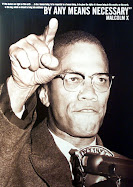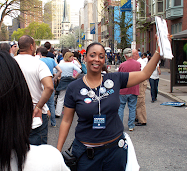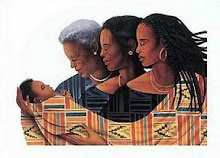Sunday, February 12, 2012
Phillis Wheatley - First African American Poet
Phillis Wheatley (1753 – December 5, 1784) was the first African American poet and first African-American woman to publish her writing. Phillis was seized from Senegal/Gambia, West Africa, when she was about seven years old. She was transported to the Boston docks with a shipment of "refugee" slaves, who because of age or physical frailty were unsuited for rigorous labor in the West Indian and Southern colonies She was purchased by the Wheatley family of Boston, who taught her to read and write, and encouraged her poetry when they saw her talent. Her first name was apparently derived from the ship that carried her to America, The Phillis.
During her life, while it was not common for American women to be published, it was especially uncommon for children of slaves to be educated at all. Her gift of writing poetry was encouraged by her owners and their daughter, Mary; they taught Phillis to read and write, with her first poem being published at the age of twelve, "On Messrs. Hussey and Coffin." The countess of Huntingdon, Selina Hastings, was a friend of the Wheatley's who greatly encouraged and financed the publication of her book of poetry, Poems. Obour Tanner, a former slave who made the journey through the middle passage with Phillis also was one of the chief influences and supporters of Phillis' craft.
In 1768, Wheatley wrote "To the King's Most Excellent Majesty," in which she praised George III for repealing the Stamp Act. As the American Revolution gained strength, Wheatley's writing turned to themes that expressed ideas of the rebellious colonists. In 1770 Wheatley wrote a poetic tribute to the evangelist George Whitefield, which received widespread acclaim. Her poetry expressed Christian themes, and many poems were dedicated to famous figures. Over one-third consist of elegies, the remainder being on religious, classical, and abstract themes. She seldom referred to her own life in her poems. Although she was an African slave, Phillis Wheatley was one of the best-known poets in prenineteenth-century America. Phillis was the abolitionists' illustrative testimony that blacks could be both artistic and intellectual. Her name was a household word among literate colonists and her achievements a catalyst for the fledgling antislavery movement.
The publication of Wheatley's Poems on Various Subjects, Religious and Moral (1773) brought her fame, both in England, and the Thirteen Colonies; figures such as George Washington praised her work. During Wheatley's visit to England with her master's son African-American poet Jupiter Hammon praised her work in his own poem. Wheatley was emancipated after the death of her master John Wheatley. She felt slavery to be the issue which separated whites from true heroism: whites can not "hope to find/Deivine acceptance with th' Almighty mind" when "they disgrace/And hold in bondage Afric's blameless race." She married soon after but she and her husband lost two children as infants. After he was imprisoned for debt in 1784, Wheatley fell into poverty and died of illness, quickly followed by the death of her surviving infant son.
An Hymn To The Evening
SOON as the sun forsook the eastern main
The pealing thunder shook the heav'nly plain;
Majestic grandeur! From the zephyr's wing,
Exhales the incense of the blooming spring.
Soft purl the streams, the birds renew their notes,
And through the air their mingled music floats.
Through all the heav'ns what beauteous dies are
spread!
But the west glories in the deepest red:
So may our breasts with ev'ry virtue glow,
The living temples of our God below!
Fill'd with the praise of him who gives the light,
And draws the sable curtains of the night,
Let placid slumbers sooth each weary mind,
At morn to wake more heav'nly, more refin'd;
So shall the labours of the day begin
More pure, more guarded from the snares of sin.
Night's leaden sceptre seals my drowsy eyes,
An Hymn to Humanity
I.
Lo! for this dark terrestrial ball
Forsakes his azure-paved hall
A prince of heav'nly birth!
Divine Humanity behold,
What wonders rise, what charms unfold
At his descent to earth!
II.
The bosoms of the great and good
With wonder and delight he view'd,
And fix'd his empire there:
Him, close compressing to his breast,
The sire of gods and men address'd,
"My son, my heav'nly fair!
III.
"Descend to earth, there place thy throne;
"To succour man's afflicted son
"Each human heart inspire:
"To act in bounties unconfin'd
"Enlarge the close contracted mind,
"And fill it with thy fire."
IV.
Quick as the word, with swift career
He wings his course from star to star,
And leaves the bright abode.
The Virtue did his charms impart;
Their G-----! then thy raptur'd heart
Perceiv'd the rushing God:
V.
For when thy pitying eye did see
The languid muse in low degree,
Then, then at thy desire
Descended the celestial nine;
O'er me methought they deign'd to shine,
And deign'd to string my lyre.
VI.
Can Afric's muse forgetful prove?
Or can such friendship fail to move
A tender human heart?
Immortal Friendship laurel-crown'd
The smiling Graces all surround
With ev'ry heav'nly Art.
A Farewel To America to Mrs. S. W.
I.
ADIEU, New-England's smiling meads,
Adieu, the flow'ry plain:
I leave thine op'ning charms, O spring,
And tempt the roaring main.
II.
In vain for me the flow'rets rise,
And boast their gaudy pride,
While here beneath the northern skies
I mourn for health deny'd.
III.
Celestial maid of rosy hue,
O let me feel thy reign!
I languish till thy face I view,
Thy vanish'd joys regain.
IV.
Susanna mourns, nor can I bear
To see the crystal show'r,
Or mark the tender falling tear
At sad departure's hour;
V.
Not unregarding can I see
Her soul with grief opprest:
But let no sighs, no groans for me,
Steal from her pensive breast.
VI.
In vain the feather'd warblers sing,
In vain the garden blooms,
And on the bosom of the spring
Breathes out her sweet perfumes.
VII.
While for Britannia's distant shore
We sweep the liquid plain,
And with astonish'd eyes explore
The wide-extended main.
VIII.
Lo! Health appears! celestial dame!
Complacent and serene,
With Hebe's mantle o'er her Frame,
With soul-delighting mein.
IX.
To mark the vale where London lies
With misty vapours crown'd,
Which cloud Aurora's thousand dyes,
And veil her charms around.
X.
Why, Phoebus, moves thy car so slow?
So slow thy rising ray?
Give us the famous town to view,
Thou glorious king of day!
XI.
For thee, Britannia, I resign
New-England's smiling fields;
To view again her charms divine,
What joy the prospect yields!
XII.
But thou! Temptation hence away,
With all thy fatal train,
Nor once seduce my soul away,
By thine enchanting strain.
XIII.
Thrice happy they, whose heav'nly shield
Secures their souls from harms,
And fell Temptation on the field
Of all its pow'r disarms!
His Excellency General Washington
Celestial choir! enthron'd in realms of light,
Columbia's scenes of glorious toils I write.
While freedom's cause her anxious breast alarms,
She flashes dreadful in refulgent arms.
See mother earth her offspring's fate bemoan,
And nations gaze at scenes before unknown!
See the bright beams of heaven's revolving light
Involved in sorrows and the veil of night!
The Goddess comes, she moves divinely fair,
Olive and laurel binds Her golden hair:
Wherever shines this native of the skies,
Unnumber'd charms and recent graces rise.
Muse! Bow propitious while my pen relates
How pour her armies through a thousand gates,
As when Eolus heaven's fair face deforms,
Enwrapp'd in tempest and a night of storms;
Astonish'd ocean feels the wild uproar,
The refluent surges beat the sounding shore;
Or think as leaves in Autumn's golden reign,
Such, and so many, moves the warrior's train.
In bright array they seek the work of war,
Where high unfurl'd the ensign waves in air.
Shall I to Washington their praise recite?
Enough thou know'st them in the fields of fight.
Thee, first in peace and honors—we demand
The grace and glory of thy martial band.
Fam'd for thy valour, for thy virtues more,
Hear every tongue thy guardian aid implore!
One century scarce perform'd its destined round,
When Gallic powers Columbia's fury found;
And so may you, whoever dares disgrace
The land of freedom's heaven-defended race!
Fix'd are the eyes of nations on the scales,
For in their hopes Columbia's arm prevails.
Anon Britannia droops the pensive head,
While round increase the rising hills of dead.
Ah! Cruel blindness to Columbia's state!
Lament thy thirst of boundless power too late.
Proceed, great chief, with virtue on thy side,
Thy ev'ry action let the Goddess guide.
A crown, a mansion, and a throne that shine,
With gold unfading, WASHINGTON! Be thine.
Phillis Wheatley
Subscribe to:
Post Comments (Atom)

.jpg)









































Dear Camron46. Thank you for these great poems of our unbelievably superior and magnificent poetess, Phillis Wheatley. I have always found her work to be astonishing as well as affirming. How so? It is astounding throughout the centuries that a slave girl from a foreign country of Africa was able to easily comprehend and verbally manipulate elevated levels of philosophy and literature, inclusive of Greek schematic thoughts which are evident in her writings. It is affirming inasmuch as it is a testimony to the capabilities of the African humanity that has been enslaved and kept unenlightened in this country and throughout the world at that time. For everywhere that the Black man has been allowed to live and learn in the world, there are clear examples that he or she could and has excelled; given the example of Bethovan -- product of mixed-race parentage, as well as Alexander Pushkin, considered the father of Russian literature, to name a few. In fact, Ms. Wheatley's poetry is on such a high plain that it becomes difficult for ordinary students to comprehend and appreciate her verbage -- even though they cannot avoid recognizing her superior talent.
ReplyDeleteWhat is even more extraordinary and to be highly prized is the fact that you have been able to locate actual video footage of African-American appreciators who have memorized and have spoken her poetry with such vigor and passion. This is also an incentive for the modern generation to become curious about the very nature of someone in Phillis' condition who could not only survive but surmount the strictures of her life and leave such glorious achievements to the world.
One criticism of compilation I must point out to you. In reproducing your "Hymn to the Evening", you have inadvertently cropped off the last line. Listening to the video recording you can derive the last line. Nonetheless, if you examine the rhyme scheme, you will note that your printed copy ends with an unmatched rhyme -- thus the lost line.
Speaking of poetic rhyme schemes, that is another marvel of the poet at the time of her writing. She was able to choose to create even more interesting patterns other than the usual aa bb, or aa bb cc, etc. patterns. In a "Hymn to Humanity" she sports an aa b, aa b pattern which is unusual as well as enthralling. This indicates the high level of her skill and thought processing. No less remarkable is to consider her convincing comprehension of difficult Greek mythological characters and conceptualizations. Moreover, her breadth of vocabulary is absolutely indicative of her high level of intelligence.
For all these reasons Ms. Wheatley remains over the centuries an admirable poet, and one who has reached the levels of esteemed British poets of note during that century. May her soul swell with pride as generations to come acknowledge her achievements for time immemorial.